威尼斯商人_英文_读后感
- 格式:doc
- 大小:17.50 KB
- 文档页数:2
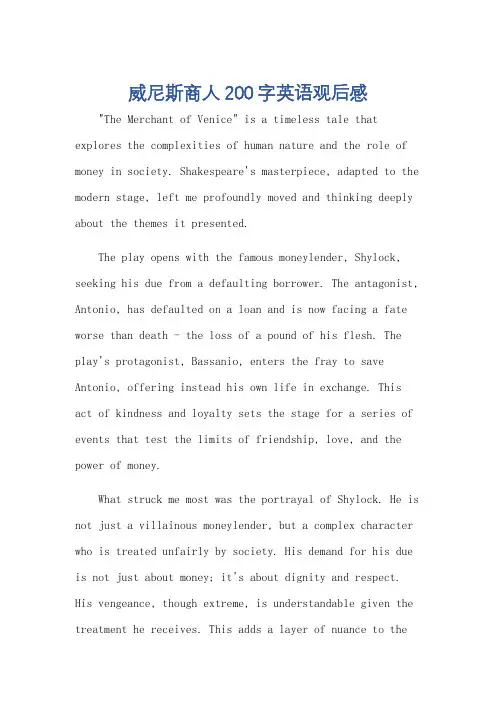
威尼斯商人200字英语观后感"The Merchant of Venice" is a timeless tale that explores the complexities of human nature and the role of money in society. Shakespeare's masterpiece, adapted to the modern stage, left me profoundly moved and thinking deeply about the themes it presented.The play opens with the famous moneylender, Shylock, seeking his due from a defaulting borrower. The antagonist, Antonio, has defaulted on a loan and is now facing a fate worse than death - the loss of a pound of his flesh. The play's protagonist, Bassanio, enters the fray to save Antonio, offering instead his own life in exchange. This act of kindness and loyalty sets the stage for a series of events that test the limits of friendship, love, and the power of money.What struck me most was the portrayal of Shylock. He is not just a villainous moneylender, but a complex character who is treated unfairly by society. His demand for his due is not just about money; it's about dignity and respect. His vengeance, though extreme, is understandable given the treatment he receives. This adds a layer of nuance to theplay, making it more relevant and thought-provoking in today's society where issues of financial inequality and discrimination are still prevalent.Bassanio's character, on the other hand, represents the ideal of love and generosity. His willingness to sacrifice himself for his friend is a testament to the power of true friendship. However, his love for Portia, another complex character, adds another dimension to the play. She challenges the social norms of the time, displaying wit, intelligence, and independence. Her marriage to Bassanio is not just about love; it's about two individuals who recognize and accept each other's true selves.The play's ending, with Shylock's conversion and Antonio's survival, offers a hopeful message that humanity can triumph over greed and hatred. It's a reminder that we all have the capacity for change and growth, even in the face of adversity.In conclusion, "The Merchant of Venice" is not just a story about money and vengeance; it's a profound exploration of human nature and the role of money in our lives. It challenges us to question our own values andbeliefs, and to consider the impact of our actions on others. The play's timeless themes and powerful messages make it a must-see for anyone interested in theater and human psychology.**《威尼斯商人》观后感:金钱与人性的较量**《威尼斯商人》这部经久不衰的剧作,深入剖析了人性的复杂性和金钱在社会中的角色。
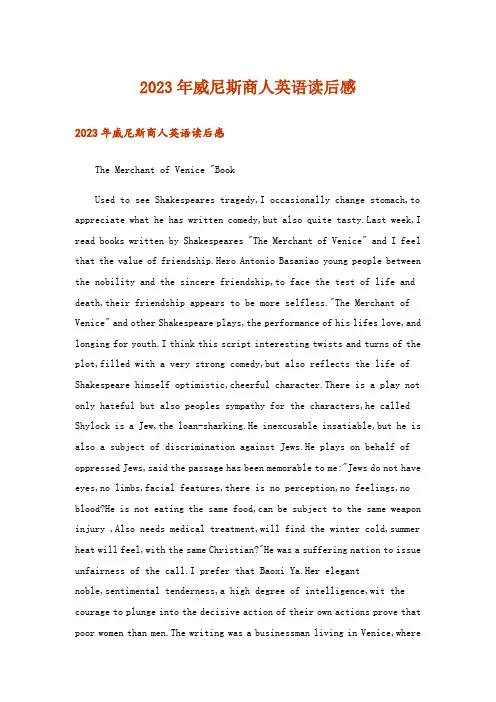
2023年威尼斯商人英语读后感2023年威尼斯商人英语读后感The Merchant of Venice "BookUsed to see Shakespeares tragedy,I occasionally change stomach,to appreciate what he has written comedy,but also quite st week,I read books written by Shakespeares "The Merchant of Venice" and I feel that the value of friendship.Hero Antonio Basaniao young people between the nobility and the sincere friendship,to face the test of life and death,their friendship appears to be more selfless."The Merchant of Venice" and other Shakespeare plays,the performance of his lifes love,and longing for youth.I think this script interesting twists and turns of the plot,filled with a very strong comedy,but also reflects the life of Shakespeare himself optimistic,cheerful character.There is a play not only hateful but also peoples sympathy for the characters,he called Shylock is a Jew,the loan-sharking.He inexcusable insatiable,but he is also a subject of discrimination against Jews.He plays on behalf of oppressed Jews,said the passage has been memorable to me:"Jews do not have eyes,no limbs,facial features,there is no perception,no feelings,no blood?He is not eating the same food,can be subject to the same weapon injury ,Also needs medical treatment,will find the winter cold,summer heat will feel,with the same Christian?"He was a suffering nation to issue unfairness of the call.I prefer that Baoxi Ya.Her elegantnoble,sentimental tenderness,a high degree of intelligence,wit the courage to plunge into the decisive action of their own actions prove that poor women than men.The writing was a businessman living in Venice,wherethe true story of the human family and friendship than anything else,this book was written out of our friend deal with the right attitude.Can not think of Shakespeares comedy writing is so interesting.2023年威尼斯商人英语读后感One of Shakespeares most powerful and controversial plays finally comes to the screen in Michael Radfords splendid adaptation of The Merchant of Venice. Briskly paced and passionately alive, Radfords compelling and handsomely filmed version of the Bards tragicomic play features a superlative cast headed by Oscar winners Al Pacino and Jeremy Irons. They, along with Joseph Fiennes and luminously gifted newcomer Lynn Collins, command the screen in The Merchant of Venice, which marks the first time the director of Il Postino has ever tackled Shakespeare. And while his traditional approach to the play may lack the cinematic dazzle of Baz Luhrmanns contemporary spin on Romeo + Juliet, theres nothing static or overly stagy about Radfords The Merchant of Venice.Filmed on location, The Merchant of Venice transports you back to the 16th century, when the citys vilified Jewish community was ghettoized. Shunned, even spat upon by the Venetian nobles and merchants, the Jewish moneylender Shylock (Pacino) has built a sizable fortune through usury. Although the merchant Antonio (Irons) despises Shylock, he nonetheless goes to him on behalf of his debt-ridden friend Bassanio (Fiennes)。
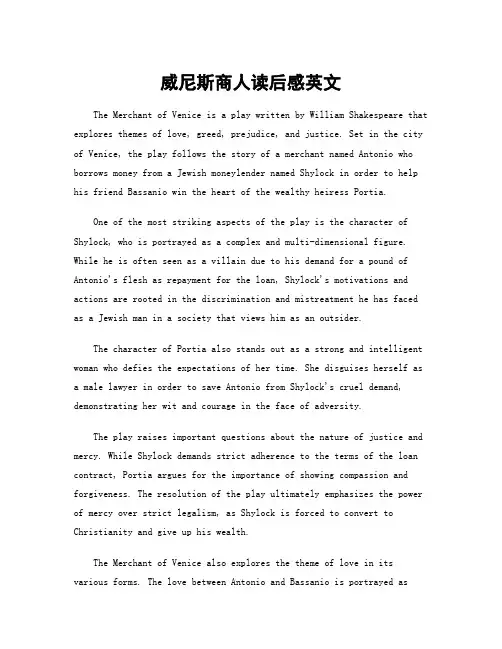
威尼斯商人读后感英文The Merchant of Venice is a play written by William Shakespeare that explores themes of love, greed, prejudice, and justice. Set in the city of Venice, the play follows the story of a merchant named Antonio who borrows money from a Jewish moneylender named Shylock in order to help his friend Bassanio win the heart of the wealthy heiress Portia.One of the most striking aspects of the play is the character of Shylock, who is portrayed as a complex and multi-dimensional figure. While he is often seen as a villain due to his demand for a pound of Antonio's flesh as repayment for the loan, Shylock's motivations and actions are rooted in the discrimination and mistreatment he has faced as a Jewish man in a society that views him as an outsider.The character of Portia also stands out as a strong and intelligent woman who defies the expectations of her time. She disguises herself as a male lawyer in order to save Antonio from Shylock's cruel demand, demonstrating her wit and courage in the face of adversity.The play raises important questions about the nature of justice and mercy. While Shylock demands strict adherence to the terms of the loan contract, Portia argues for the importance of showing compassion and forgiveness. The resolution of the play ultimately emphasizes the power of mercy over strict legalism, as Shylock is forced to convert to Christianity and give up his wealth.The Merchant of Venice also explores the theme of love in its various forms. The love between Antonio and Bassanio is portrayed asdeep and enduring, while the romantic love between Bassanio and Portiais tested by external challenges. The play suggests that true love transcends social barriers and material wealth, and that it isultimately more valuable than money or possessions.In conclusion, The Merchant of Venice is a thought-provoking play that continues to resonate with audiences today. Its exploration of complex characters, moral dilemmas, and timeless themes make it a work of literature that is rich in depth and meaning. Shakespeare's masterful storytelling and insightful commentary on human nature ensure that the play remains relevant and compelling for readers and audiences around the world.。
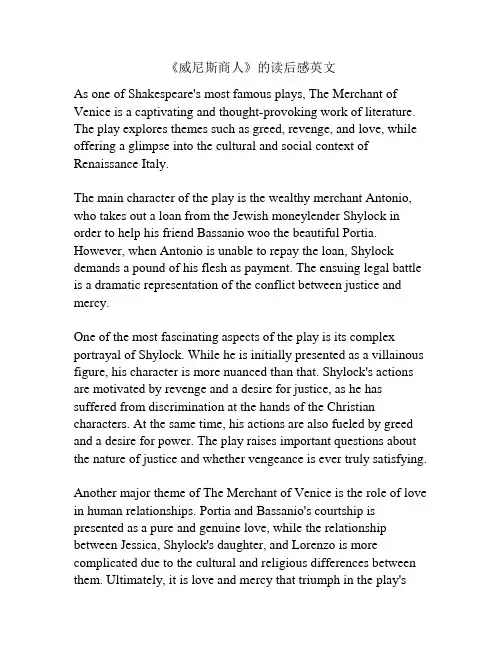
《威尼斯商人》的读后感英文As one of Shakespeare's most famous plays, The Merchant of Venice is a captivating and thought-provoking work of literature. The play explores themes such as greed, revenge, and love, while offering a glimpse into the cultural and social context of Renaissance Italy.The main character of the play is the wealthy merchant Antonio, who takes out a loan from the Jewish moneylender Shylock in order to help his friend Bassanio woo the beautiful Portia. However, when Antonio is unable to repay the loan, Shylock demands a pound of his flesh as payment. The ensuing legal battle is a dramatic representation of the conflict between justice and mercy.One of the most fascinating aspects of the play is its complex portrayal of Shylock. While he is initially presented as a villainous figure, his character is more nuanced than that. Shylock's actions are motivated by revenge and a desire for justice, as he has suffered from discrimination at the hands of the Christian characters. At the same time, his actions are also fueled by greed and a desire for power. The play raises important questions about the nature of justice and whether vengeance is ever truly satisfying. Another major theme of The Merchant of Venice is the role of love in human relationships. Portia and Bassanio's courtship is presented as a pure and genuine love, while the relationship between Jessica, Shylock's daughter, and Lorenzo is more complicated due to the cultural and religious differences between them. Ultimately, it is love and mercy that triumph in the play'sclimactic scene, as Portia cleverly argues in court to save Antonio's life.The Merchant of Venice is also notable for its exploration of religious and cultural differences in Renaissance Italy. The play highlights the prejudice and discrimination faced by Jews, as well as the tension between Christians and Muslims during this time period. It is a reminder of the importance of tolerance and acceptance in a society that is often divided by differences.In conclusion, The Merchant of Venice is a timeless masterpiece of literature that continues to captivate audiences today. With its complex characters and themes, it offers a thought-provoking exploration of the human condition. The play raises questions about justice, love, and the role of cultural and religious differences in society. Despite being written over four hundred years ago, it remains a relevant and important work of art.One of the key themes explored in The Merchant of Venice is the idea of mercy. Shakespeare raises the question of whether justice alone is sufficient for resolving conflicts, or whether mercy also has a place in the legal system. This theme is particularly relevant in the context of Shylock's demand for a pound of flesh from Antonio. While Shylock argues that he has the legal right to his payment, Portia's clever arguments ultimately convince the court to show mercy towards Antonio.Additionally, The Merchant of Venice is a play that explores the nature of friendship. The relationship between Antonio and Bassanio is complex and multi-faceted, and is perhaps one of the most significant relationships in the play. The bond between thetwo men is tested by Bassanio's romantic pursuits and Antonio's financial troubles, but ultimately, it is their loyalty and willingness to sacrifice for each other that prevails.The character of Portia is also worth examining as she represents a strong and intelligent female character in a male-dominated society. Her wit and intelligence are key to her success in the court scene, and her agency is evident in her manipulation of the situation to ensure that justice and mercy are served.Finally, The Merchant of Venice is a play that raises questions about the role of money and commerce in society. The idea of a merchant seeking financial gain above all else, even at the expense of their own personal relationships and moral values, is explored in the character of Antonio. Similarly, the character of Shylock embodies the dangers of greed and the corrupting influence of money on both individuals and society as a whole.Overall, The Merchant of Venice is a play that explores complex themes and ideas that are still relevant today. It encourages audiences to think critically about justice, mercy, friendship, money, and cultural and religious tolerance, making it an enduring work of literature.。
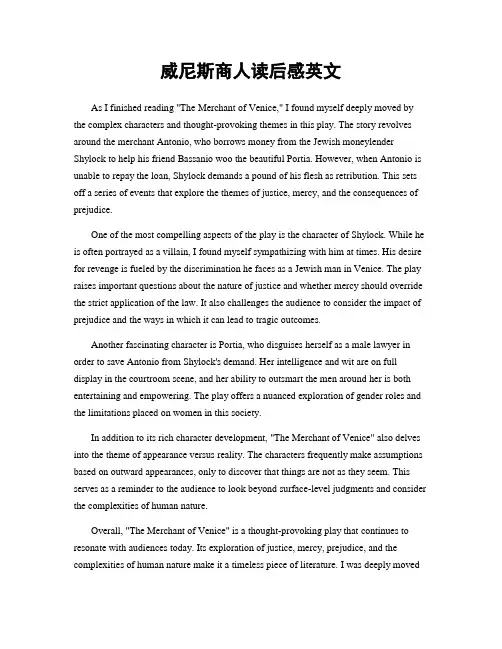
威尼斯商人读后感英文As I finished reading "The Merchant of Venice," I found myself deeply moved by the complex characters and thought-provoking themes in this play. The story revolves around the merchant Antonio, who borrows money from the Jewish moneylender Shylock to help his friend Bassanio woo the beautiful Portia. However, when Antonio is unable to repay the loan, Shylock demands a pound of his flesh as retribution. This sets off a series of events that explore the themes of justice, mercy, and the consequences of prejudice.One of the most compelling aspects of the play is the character of Shylock. While he is often portrayed as a villain, I found myself sympathizing with him at times. His desire for revenge is fueled by the discrimination he faces as a Jewish man in Venice. The play raises important questions about the nature of justice and whether mercy should override the strict application of the law. It also challenges the audience to consider the impact of prejudice and the ways in which it can lead to tragic outcomes.Another fascinating character is Portia, who disguises herself as a male lawyer in order to save Antonio from Shylock's demand. Her intelligence and wit are on full display in the courtroom scene, and her ability to outsmart the men around her is both entertaining and empowering. The play offers a nuanced exploration of gender roles and the limitations placed on women in this society.In addition to its rich character development, "The Merchant of Venice" also delves into the theme of appearance versus reality. The characters frequently make assumptions based on outward appearances, only to discover that things are not as they seem. This serves as a reminder to the audience to look beyond surface-level judgments and consider the complexities of human nature.Overall, "The Merchant of Venice" is a thought-provoking play that continues to resonate with audiences today. Its exploration of justice, mercy, prejudice, and the complexities of human nature make it a timeless piece of literature. I was deeply movedby the moral and ethical questions it raises, and I believe it serves as a powerful reminder of the importance of empathy and understanding in our interactions with others.。
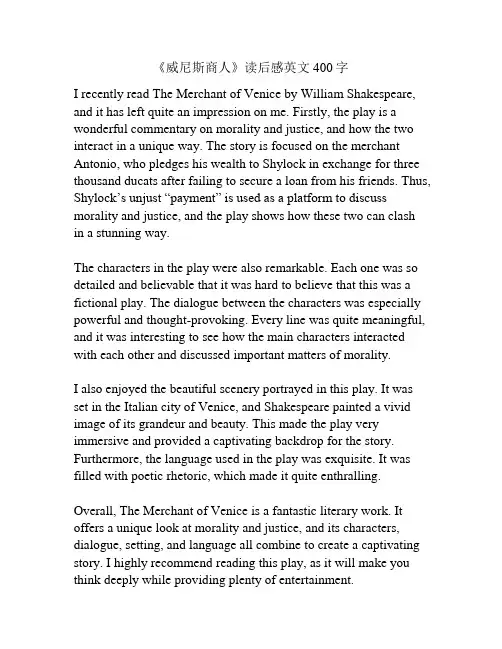
《威尼斯商人》读后感英文400字I recently read The Merchant of Venice by William Shakespeare, and it has left quite an impression on me. Firstly, the play is a wonderful commentary on morality and justice, and how the two interact in a unique way. The story is focused on the merchant Antonio, who pledges his wealth to Shylock in exchange for three thousand ducats after failing to secure a loan from his friends. Thus, Shylock’s unjust “payment” is used as a platform to discuss morality and justice, and the play shows how these two can clashin a stunning way.The characters in the play were also remarkable. Each one was so detailed and believable that it was hard to believe that this was a fictional play. The dialogue between the characters was especially powerful and thought-provoking. Every line was quite meaningful, and it was interesting to see how the main characters interacted with each other and discussed important matters of morality.I also enjoyed the beautiful scenery portrayed in this play. It was set in the Italian city of Venice, and Shakespeare painted a vivid image of its grandeur and beauty. This made the play very immersive and provided a captivating backdrop for the story. Furthermore, the language used in the play was exquisite. It was filled with poetic rhetoric, which made it quite enthralling. Overall, The Merchant of Venice is a fantastic literary work. It offers a unique look at morality and justice, and its characters, dialogue, setting, and language all combine to create a captivating story. I highly recommend reading this play, as it will make you think deeply while providing plenty of entertainment.。
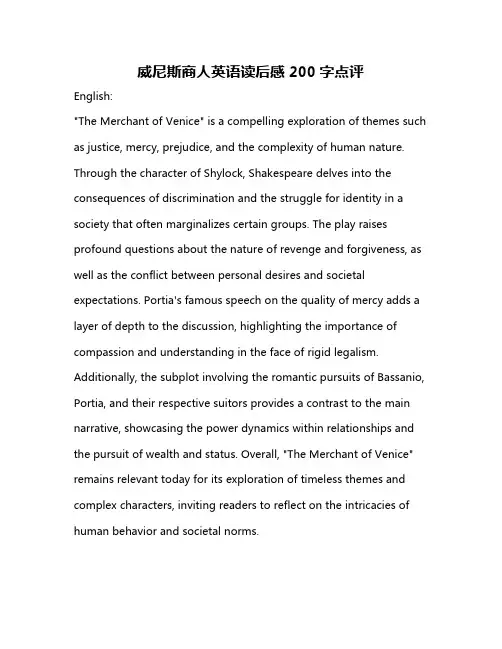
威尼斯商人英语读后感200字点评English:"The Merchant of Venice" is a compelling exploration of themes such as justice, mercy, prejudice, and the complexity of human nature. Through the character of Shylock, Shakespeare delves into the consequences of discrimination and the struggle for identity in a society that often marginalizes certain groups. The play raises profound questions about the nature of revenge and forgiveness, as well as the conflict between personal desires and societal expectations. Portia's famous speech on the quality of mercy adds a layer of depth to the discussion, highlighting the importance of compassion and understanding in the face of rigid legalism. Additionally, the subplot involving the romantic pursuits of Bassanio, Portia, and their respective suitors provides a contrast to the main narrative, showcasing the power dynamics within relationships and the pursuit of wealth and status. Overall, "The Merchant of Venice" remains relevant today for its exploration of timeless themes and complex characters, inviting readers to reflect on the intricacies of human behavior and societal norms.中文翻译:《威尼斯商人》是对正义、仁慈、偏见以及人性复杂性等主题的引人深思的探索。
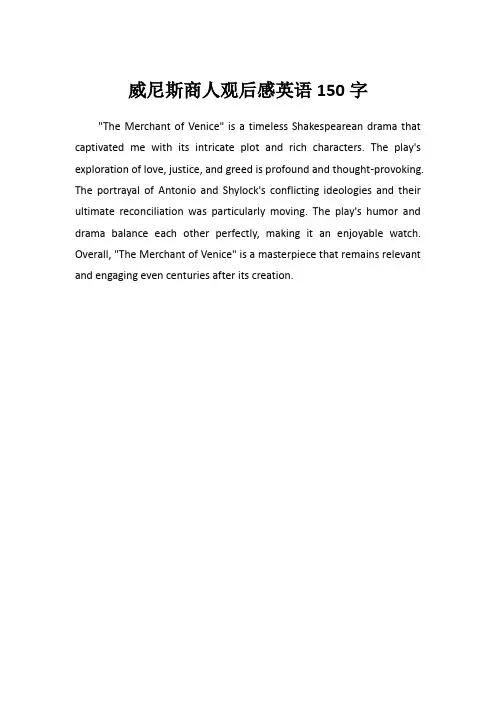
威尼斯商人观后感英语150字
"The Merchant of Venice" is a timeless Shakespearean drama that
captivated me with its intricate plot and rich characters. The play's
exploration of love, justice, and greed is profound and thought-provoking.
The portrayal of Antonio and Shylock's conflicting ideologies and their
ultimate reconciliation was particularly moving. The play's humor and
drama balance each other perfectly, making it an enjoyable watch.
Overall, "The Merchant of Venice" is a masterpiece that remains relevant
and engaging even centuries after its creation.
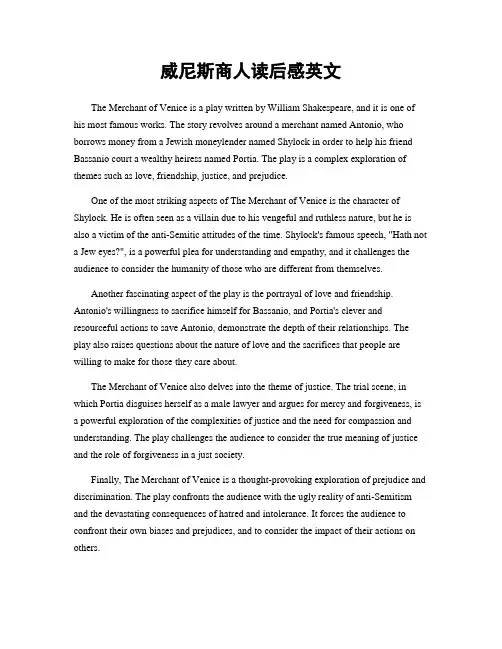
威尼斯商人读后感英文The Merchant of Venice is a play written by William Shakespeare, and it is one of his most famous works. The story revolves around a merchant named Antonio, who borrows money from a Jewish moneylender named Shylock in order to help his friend Bassanio court a wealthy heiress named Portia. The play is a complex exploration of themes such as love, friendship, justice, and prejudice.One of the most striking aspects of The Merchant of Venice is the character of Shylock. He is often seen as a villain due to his vengeful and ruthless nature, but he is also a victim of the anti-Semitic attitudes of the time. Shylock's famous speech, "Hath not a Jew eyes?", is a powerful plea for understanding and empathy, and it challenges the audience to consider the humanity of those who are different from themselves.Another fascinating aspect of the play is the portrayal of love and friendship. Antonio's willingness to sacrifice himself for Bassanio, and Portia's clever and resourceful actions to save Antonio, demonstrate the depth of their relationships. The play also raises questions about the nature of love and the sacrifices that people are willing to make for those they care about.The Merchant of Venice also delves into the theme of justice. The trial scene, in which Portia disguises herself as a male lawyer and argues for mercy and forgiveness, is a powerful exploration of the complexities of justice and the need for compassion and understanding. The play challenges the audience to consider the true meaning of justice and the role of forgiveness in a just society.Finally, The Merchant of Venice is a thought-provoking exploration of prejudice and discrimination. The play confronts the audience with the ugly reality of anti-Semitism and the devastating consequences of hatred and intolerance. It forces the audience to confront their own biases and prejudices, and to consider the impact of their actions on others.In conclusion, The Merchant of Venice is a powerful and thought-provoking play that explores a wide range of complex themes. It challenges the audience to consider the nature of love, friendship, justice, and prejudice, and it forces us to confront our own beliefs and attitudes. The play's enduring relevance and powerful message make it a timeless classic that continues to resonate with audiences today.。
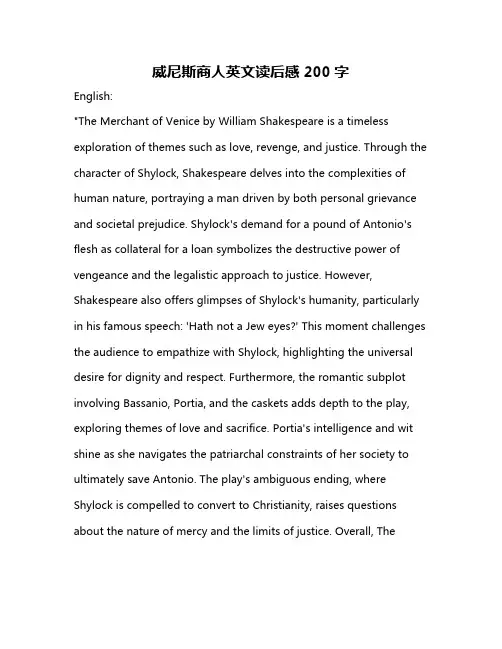
威尼斯商人英文读后感200字English:"The Merchant of Venice by William Shakespeare is a timeless exploration of themes such as love, revenge, and justice. Through the character of Shylock, Shakespeare delves into the complexities of human nature, portraying a man driven by both personal grievance and societal prejudice. Shylock's demand for a pound of Antonio's flesh as collateral for a loan symbolizes the destructive power of vengeance and the legalistic approach to justice. However, Shakespeare also offers glimpses of Shylock's humanity, particularly in his famous speech: 'Hath not a Jew eyes?' This moment challenges the audience to empathize with Shylock, highlighting the universal desire for dignity and respect. Furthermore, the romantic subplot involving Bassanio, Portia, and the caskets adds depth to the play, exploring themes of love and sacrifice. Portia's intelligence and wit shine as she navigates the patriarchal constraints of her society to ultimately save Antonio. The play's ambiguous ending, where Shylock is compelled to convert to Christianity, raises questions about the nature of mercy and the limits of justice. Overall, TheMerchant of Venice remains a thought-provoking work that continues to resonate with audiences worldwide."中文翻译:《威尼斯商人》是威廉·莎士比亚对爱情、复仇和正义等主题的永恒探索。
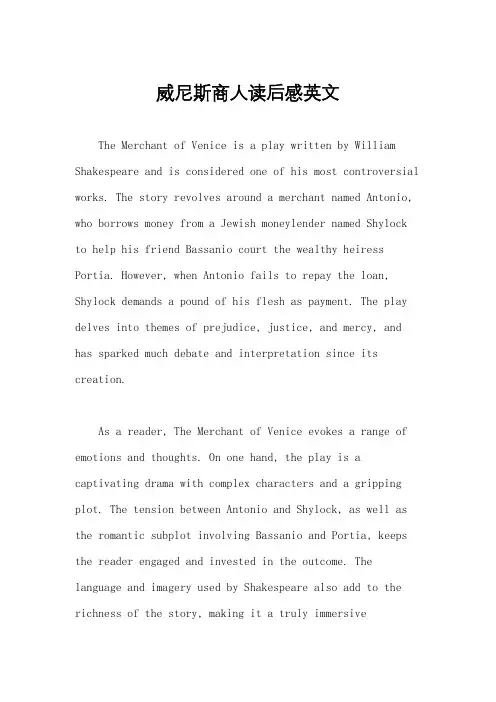
威尼斯商人读后感英文The Merchant of Venice is a play written by William Shakespeare and is considered one of his most controversial works. The story revolves around a merchant named Antonio, who borrows money from a Jewish moneylender named Shylock to help his friend Bassanio court the wealthy heiress Portia. However, when Antonio fails to repay the loan, Shylock demands a pound of his flesh as payment. The play delves into themes of prejudice, justice, and mercy, and has sparked much debate and interpretation since its creation.As a reader, The Merchant of Venice evokes a range of emotions and thoughts. On one hand, the play is a captivating drama with complex characters and a gripping plot. The tension between Antonio and Shylock, as well as the romantic subplot involving Bassanio and Portia, keeps the reader engaged and invested in the outcome. The language and imagery used by Shakespeare also add to the richness of the story, making it a truly immersiveexperience.However, what makes The Merchant of Venice truly remarkable is its exploration of deep and timeless themes. The play delves into the nature of prejudice and discrimination, particularly against the Jewish community. Shylock, the Jewish moneylender, is portrayed as a villainous character, but as the story unfolds, the audience is forced to confront the injustices he has faced and the humanity within him. This portrayal challenges the audience to consider the impact of prejudice and the complexities of human nature.Additionally, The Merchant of Venice raises thought-provoking questions about justice and mercy. The famous courtroom scene, in which Shylock demands his pound of flesh, forces the characters and the audience to grapple with the concepts of legal justice versus moral justice. Portia's clever intervention and the ultimate resolution of the conflict highlight the power of mercy and forgiveness, even in the face of deep-seated animosity.The play also offers a nuanced exploration of the nature of friendship and loyalty. Antonio's willingness to go to extreme lengths to help his friend Bassanio, even at great personal cost, speaks to the depth of their bond. The sacrifices made and the risks taken in the name of friendship serve as a powerful reminder of the importance of human connection and empathy.Furthermore, The Merchant of Venice is a reflection of the complexities of love and relationships. The romantic entanglements of the characters, particularly the courtship of Bassanio and Portia, provide a counterpoint to the darker themes of the play. The exploration of love, trust, and fidelity adds depth and emotional resonance to the story, making it a truly multifaceted work.In conclusion, The Merchant of Venice is a thought-provoking and emotionally resonant play that continues to captivate readers and audiences centuries after its creation. Its exploration of prejudice, justice, mercy, friendship, and love makes it a timeless work that invites reflection and discussion. As a reader, delving into theworld of The Merchant of Venice is a rich and rewarding experience that leaves a lasting impact.。
威尼斯商人电影观后感英文版"The Merchant of Venice" Movie ReviewAfter watching "The Merchant of Venice", I was deeply moved by its intricate plot, vivid characters, and timeless themes. This film, an adaptation of Shakespeare's classic play, successfully captured the essence of the original work while adding a modern touch to the story.The film's narrative focuses on the complex relationship between Antonio, a wealthy merchant, and Shylock, a Jewish moneylender. Antonio, desperate for funds to support his friend Bassanio's pursuit of love, enters into a dangerous deal with Shylock, promising a pound of flesh if he defaults on the loan. This tense agreement sets the stage for a drama that explores themes of love, loyalty, jealousy, and vengeance.The casting of the film was excellent. The actors portrayed their characters with great depth and nuance, making them believable and relatable. The portrayal of Shylock, in particular, was both sympathetic and complex, allowing the audience to see his motivations and reasons behind his actions.The film's visual style was also noteworthy. The cinematography was stunning, capturing the beauty and grandeur of Venice while also effectively conveying theemotional tone of the story. The costumes and sets were also meticulously designed, adding to the film's authenticity and immersion.However, I must admit that some aspects of the film did not fully resonate with me. The modernization of the story, while interesting, sometimes felt a bit jarring and out of place. Additionally, some of the dialogue seemed a bit forced and unnatural, which broke the immersion slightly.Overall, "The Merchant of Venice" is a visually stunning and emotionally charged film that successfully adapts Shakespeare's classic play for a modern audience. While it may not be perfect, it certainly deserves to be seen and appreciated for its many strengths. I highly recommend this film to anyone interested in Shakespeare or in exploring themes of love, loyalty, and vengeance in a contemporary context."。
The Merchant of Venice
Shakespeare is Britain's the most outstanding Renaissance masters.Shakespeare's play, "The Merchant of Venice" explored the timeless topic of money and love. Money is the world's most valuable things .There is something even more precious than money? Rich and moving story of family ties, witty dialogue, the plot turn, exaggerated the circumstances of Comedy, romance and legend is full of color. Is intertwined with friendship, love, love the world and lead us to understanding what is important in life.
The play tells a story that happens in Italy. A moneyless young Venetian, Bassanio, is making preparations to propose to Portia, a rich beauty of Belmont. He needs money and appeals to his friend Antonio, a merchant of Venice, for help. But Antonio’s money is invested in ships at sea. To help Bassanio in his courtship, he borrows money from Shylock the Jewish usurer. Shylock, who has been insulted by Antonio and other Christians, however, agrees to lend the money on the condition that if the loan is not paid in time, he may cut a pound of flesh from Antonio’s body. With this money, Bassanio goes to Belmont and succeed in the marriage with Portia. But news comes that Antonio’s ship sank and can’t return on time so he ca nnot pay the loan. Shylock demands his pound of flesh. The case is brought before the court. Antonio is in danger. At the critical moment, a young doctor of law arrives at the court. He appeals to Shylock for mercy with a moving speech, but in vain. Then the doctor admits the validity of Shylock’s claim, but warns him, under pain of death, that he must fulfill the every letter of his bond, taking no more and no less than one pound of flesh, and spilling no drop of blood. Seeing himself thus cornered, the Jew has no choice but to obey the verdict of the court. To everyone’s surprise, the young doctor of law who saves the life of Antonio is Portia in disguise. Finally they live together happily. The story has a happy ending in theory. But I don’t think the end is really happy and is a kind of “grave comedy”.
In this single-minded pursuit of a pound of flesh, his frequent mentions of the cruelty he has endured at Christian hands make it hard for us to label him a natural born monster. In one of Shakespeare’s m ost famous monologues, for example, Shylock argues that Jews are humans and calls his quest for vengeance the product of lessons taught to him by the cruelty of Venetian citizens. On the other hand, Shylock’s coldly calculated attempt to revenge the wrongs done to him by murdering his persecutor, Antonio, prevents us from viewing him in a primarily positive light. Shakespeare gives us unmistakably human moments, but he often steers us against Shylock as well, painting him as a miserly, cruel, and prosaic figure. But I think Shylock suffers much discrimination for he is a Jew. It‘s unfair. All men were born equally.
We can learn much from the play. Money is important, but there are many far more important things in this world. Do not be fooled by the surface. In our real live we should threat everyone equally and do not have color vision to look at other people. And when we meet with unexpected difficulties, we should keep calm and solve it skillfully just as Portia does......。